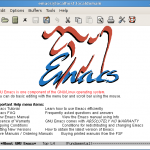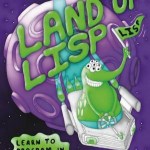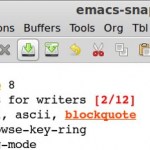emacs
When I first became a regular user of Linux, several years ago, I tried out different text editors and quickly discovered that emacs was my best choice. By coincidence, about that time I ran into an old emacs manual written by Richard Stallman in the dollar section of a used booksore. In that edition, near the end of the book, was a section on “Mail Amusements.” This documented the command “M-x spook” which adds “a line of randomly chosen keywords to an outgoing mail message. The keywords are chosen from a list of words that suggest you are discussing something subversive.” (I note that the…
Or, at least, I'm surprised that this earlier implemented solution has not been mentioned in all the discussion about NSA spying.
Richard Stallman invented an approach to obviating the NSA's attempts to spy on email. He included it in emacs, the world's greatest text editor. Here how it works, from the manual. The "M" is the "alt" key (for all practical purposes) and "M-x followed by a word implements the command attached to that word.
32.6 Mail Amusements
M-x spook adds a line of randomly chosen keywords to an outgoing mail message. The keywords are chosen from a list of words that…
I just reconfigured my laptop with a new system (a form of Linux) and, almost as important, a new power brick. That second item may be more interesting than it sounds for some of you; I'll write that up later. This change also meant trashing my emacs configuration file. I didn't have to trash it, of course, but it made sense to do so. I don't use my laptop in any way that requires that I pay attention to data saved on it. It is a data-free appliance. Sort of. Or, at least, if I took the hard drive out of it and put it in a blender, I would not lose anything important other than a…
('born '1927)
('championed 'ai)
('created 'lisp)
('thought-up 'space-elevator)
('won 'turing-award)
('died 'oct-23-2011)
You will recall that I recently reviewed the book Land of Lisp. It turns out I've got two copies of it, and would like to give one away. To you. As a bounty.
This is not a contest. It is a bounty. You can "win" a brand new copy of Land of Lisp very easily. What you need to do is to supply the best eLisp code, in my opinion, in the comments below. The code should have the following characteristics:
1) It should work, probably as an .el file. Code that you just think might work or has parts like "Then you do something like this bla bla bla" is interesting and you are welcome to post it…
Land of Lisp: Learn to Program in Lisp, One Game at a Time! is a book about lisp programming. If you are into programming for fun, artificial intelligence, role playing games, or an emacs user, you should take a look at this book. I've got some info on this book as well as a few others for the budding emacs enthusiasts.
Land of Lisp teaches the lisp programming language using the development of games as a focal point.
Lisp is one of the oldest programming languages, and occurs in numerous dialects. The standard form that is taught in Land of Lisp is Common Lisp.
The teaching style in…
I have a small laptop that I carry to the coffee shop for writing. It is a bit shaky in the hardware department, very small, and has no functioning wireless. The hard drive is encrypted. These attributes together make it the perfect laptop to carry around between, say, the gym, the coffee shop, the grocery store, Huxley's daycare, etc. I have a small number of files synced on it via a hard wired network connection at home so there is quasi-real time work to do with it, but only a subset of the larger number of files and folders I regularly use. The lack of an Internet connection means…
How come nobody told me about this!!!!
I eagerly await my copy of Land of Lisp: Learn to Program in Lisp, One Game at a Time!.
And while we are on the topic, Behold The Power of Regex: Emacs Lisp: Writing a Date Time String Parsing Function
After a little messing around with interesting emacs goodies, we might as well get right on to the good stuff.
emacs uses a concept called "modes." You'll learn about that if you use emacs. For now, what you need to know is that there are "major modes" and "minor modes" and we're only interested in major modes at this moment. There are several major modes that make emacs highly useful for specific purposes, and some of those modes are designed with writing in mind, such as the text-mode the outline-mode and what is known as muse-mode. But writers really want to use org-mode and not much…
Emacs Column Editing from Mark Mansour on Vimeo.
... obviously, we're talking about emacs ...
I asked my email-pal: "UNIX or Windoze?". He replied "UNIX". I said "Ah...me too!".
I asked my email-pal: "Linux or AIX?". He said "Linux, of course". I said "Me too".
I asked him: "Emacs or vi". He replied "Emacs". I said "Me too. Small world."
I asked him: "GNU Emacs or XEmacs?", and he said "GNU Emacs". I said "oh, me too."
I asked him "GNU Emacs 19 or GNU Emacs 20"? and he said "GNU Emacs 19". I said "oh, me too."
I asked him, "GNU Emacs 19.29 or GNU Emacs 19.34", and he replied "GNU Emacs 19.29". I said "DIE YOU OBSOLETE NOGOOD SOCIALLY…
OK, that was the easy version. Now, here's the gruesome details:



